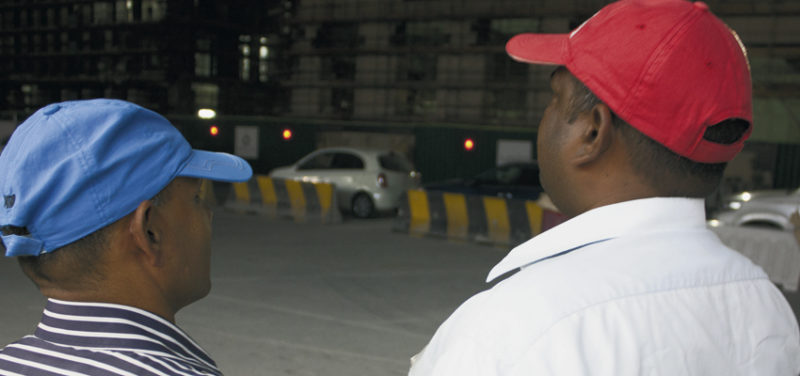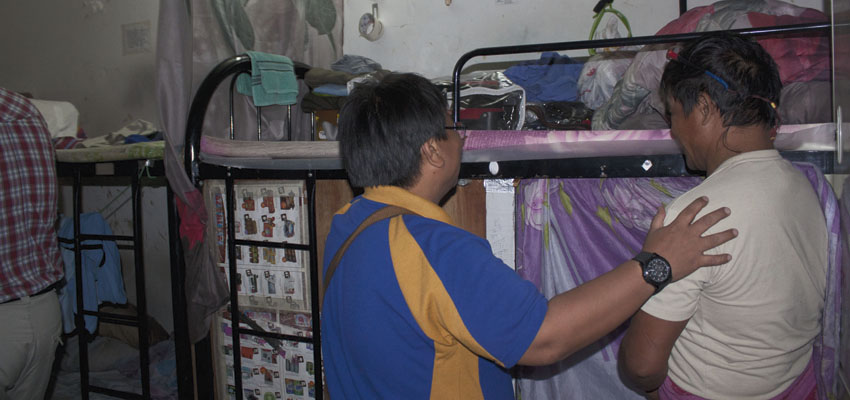Lighting up Qatari dusk

It’s late evening in the Qatari capital, Doha. Ramesh from India is outside the workers camp, ran by one of the biggest stadium construction projecters ahead of the Fifa World Cup. The worker in front of him is afraid. He moves further away from the entrance to the camp. The security guards patrol. Stop. Try to listen. The worker is afraid of being caught, saying something wrong, being sent home and losing his income.
Ramesh stands firm but knows what it’s like. He’s felt the same deep-rooted fear himself. He was a carpenter and migrant for 23 years. He worked in totalitarian states like Saudi Arabia and Qatar, notorious for their kafala system, which is similar to slavery and gives the employer absolute power.
But now the Indian carpenter has another mission. In a country where migrants are banned from joining a union, he is trying to recruit members and help vulnerable workers, together with two other organisers sent by the global construction union BWI. The union has launched a campaign spanning several years to give workers emergency help and to try to change the system in the long term. The background is the effects of the kafala system coupled with all the alarming reports of workers cheated out of pay, terrible accommodation and thousands of workers who have died from accidents or illnesses caused by the work.
Ramesh has experienced the same things as the building workers he meets. He has worked as a carpenter in Saudi Arabia, Kuwait, Qatar and Russia. He has paid money to recruitment agencies, been cheated out of pay, lived in rooms with 10–12 building workers, had his passport taken away and been stopped from travelling home.
”The worst country to work in was Saudi Arabia. There I was locked up for 15 days by my employer,” he says.
Also read: Football expert – ”Fifa does not care”
In Doha, a city in which construction continues day and night, I meet Ramesh and his two colleagues, Krishna from Nepal and Juan from the Philippines. I get to go with them and see the reality that greets them and the workers.They have to stay anonymous because of the risks. They follow the law but if they make one false move they risk being thrown out of the country or imprisoned. A fate they share with the construction workers they want to help.
They are here because construction is taking place like never before in Qatar, a country rich in oil and natural gas. The Fifa World Cup is creating a need for sports facilities, accommodation, hotels and infrastructure. The construction workers are migrants. There are 1.5 million in Qatar and they represent approximately 94% of the country’s workforce. Most of them come from India and Nepal, and there is also a large group from the Philippines. The organisers also come from these countries, after being proposed by the unions in their home countries.They have only been in Qatar for a few months but they have begun to build a network of contacts. They meet a lot of construction workers who have left poverty in their home countries and come with dreams of a better life. However, these dreams are often shattered by debt or, in the worst cases, death. The organisers’ task is to gain the workers’ trust and show them that help is available. But the visits are far from straightforward.
”I still get scared when I go out. Perhaps someone will give me away and the company will phone the police. Not everyone wants to be disturbed,” explains organiser Juan. Not at the same time. When the workers see that they can get help and they find out that they also have rights, an opportunity arises to speak further.
I accompany Juan to a camp where the workers live. We travel in the dust of an industrial area on the outskirts of Doha. The camp is messy, crowded and hot. The kitchen is filthy and the bottled gas hotplates are rusted through in a way that makes them seem hazardous. Eight to ten people live in rooms where there should only really be four. A notice bans the workers from leaving the building after nine o’clock in the evening. A construction worker sits in a crowded room. His two-year contract is over and now he just wants to go home.
”I’ve been waiting 15 days for a return ticket and I still haven’t got it from my employer. Several colleagues are in the same situation.”
In the next bed a father of five is waiting for the same thing. By law a migrant worker is forbidden from leaving the country without his employer’s permission. It is also impossible to break a contract and come home, even if a loved one has died.
![]()
Facts: The kafala system
- The kafala system in Qatar and other Gulf States means that a sponsor, usually the employer, has to guarantee the worker’s legal stay in the country.
- The sponsor often takes away the worker’s passport on their arrival.
- The guest worker cannot change employer or break their contract without the sponsor’s permission. Guest workers who leave their employer can be reported missing and imprisoned.
- The worker is not allowed to leave the country without the sponsor’s permission.
- Strikes and trade union organisation are forbidden among guest workers.
![]()
In Qatar, migrants are banned from joining trade unions but now they can still be members on site through a collaboration between BWI and the unions in their home countries. So far 1,300 workers have joined in this way. Efforts to help workers have been based on a tradition of different social support groups, which have been formed by the migrants themselves. This work has continued with the launch of social networks which aim to provide advice, support and legal assistance. These networks have been supported by BWI in collaboration with the home country’s union organisations. Legal Qatari branches of trade unions have been formed.
Some of the workers have already taken part in meetings arranged by the unions in their home countries before leaving. Membership is not openly talked about in the workplace. And it takes courage to go to the meetings about addressing the workers’ conditions.
During the late evenings, Ramesh and his colleague Krishna from Nepal have been out to the camps to meet the workers in an effort to convince them that they should go to a meeting.

An immigrant workers´camp outside of Doha. Photo by: Margite Fransson.
It’s now Friday and a day off in Muslim Qatar. The venue, a restaurant, is packed. The workers find out about their rights and planned initiatives, but now they also have the courage to talk about their personal experiences. Unpaid wages, double contracts, passports taken away, workers prevented from travelling home. The stories add up. Several workers have had their wages delayed by two or three months. Others give evidence of being forced to buy food at the camps at high prices. And then there are the accidents. To date 1,800 building workers are estimated to have lost their lives in accidents or through illness caused by work. The figures are not reliable, but workers at the meeting say that many accidents are never reported.
”Yesterday a colleague of mine had an accident. His left hand was cut off,” says a worker.Other witnesses to the same accident say that the colleague lost his hand when his sleeve got caught in a machine. In the end the police took him to hospital. No one else dared to help.
A man, burdened by severe leg injuries, sits at the front. He has his documents with him, a picture of his bloody leg with a large gash down to the bone. He’s a bricklayer and badly injured his leg in a fall. Despite a great many operations the injuries are still there. The employer says the accident is his own fault, even though he was following orders. Now he’s scared he won’t be able to work again – and of being forced to return home without any compensation. At the meeting he makes contact with his country’s embassy and listens to a lawyer who tells him about workers’ legal rights.
”There is a tremendous need for help,” says one representative from BWI. He has been active in the region for a long time and is now working together with the organisers.
In many cases the Nepalese workers, who are the lowest paid, are the worst affected. Organiser Krishna discovers a lot of problems among his countrymen. One of the worst stories he heard was that of a family who had to wait 22 months for the body of a Nepalese construction worker who died in an accident.
Krishna has been a policeman, security guard and worked as a migrant in Qatar.”I’ve been cheated myself, so I want to stop others from suffering,” he says.
Juan says that he is driven by a desire to bring about change.
”The wonderful stadiums are the result of workers’ blood, sweat and tears. During the Fifa World Cup, television viewers will see a beautiful green paradise – but that hides a shocking truth of low wages and terrible conditions.”
Note: Some of the names in the article has been changed.